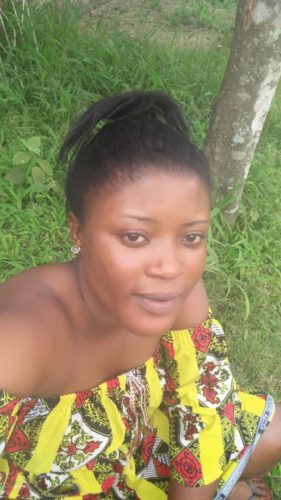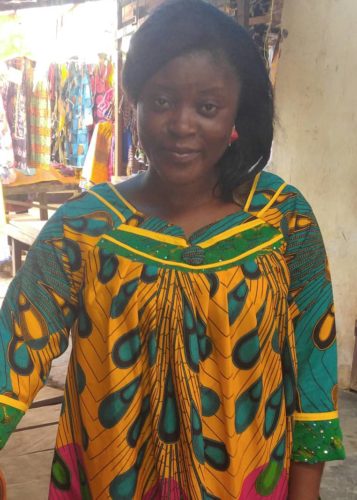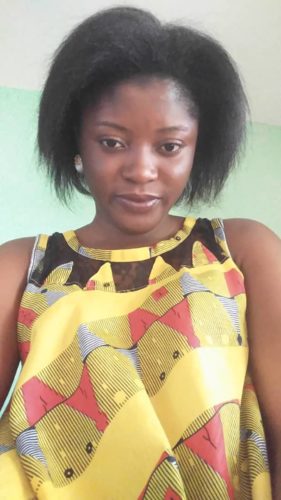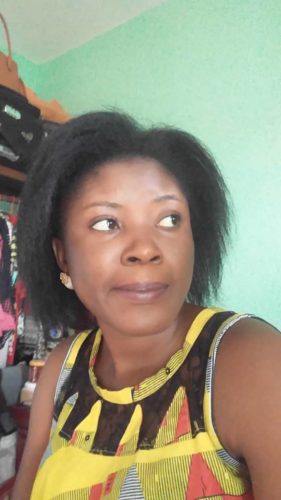 Twenty-seven-year-old Precious Miriam grew up in a blended family in Cameroon. Although she had five siblings, she was the only child from her mother and father’s union. She was 9 years old when her father died.
Twenty-seven-year-old Precious Miriam grew up in a blended family in Cameroon. Although she had five siblings, she was the only child from her mother and father’s union. She was 9 years old when her father died.
“When I lost him, I encountered lots of problems due to the fact that I did not have a helping hand at that moment,” Miriam told The Weight She Carries. “Nobody to sponsor me as far a school was concerned, and nobody to care for me, generally.”
One of her uncles initially provided for Miriam financially, but he decided to stop due to the influence of bad friends, she said.
Her mother remarried a man who was not interested in supporting Miriam.
“The man did not want to see me, he didn’t contribute to anything I was up to,” she said. “Even though I would spend school holidays with him and work on his cocoa farm, at the end of the year, I would have nothing to show for it.”
Seeing her mother attach herself to a man who did not accept her child affected the relationship Miriam had with her mother.
“My step-father has never helped me in my life. He does everything for his children, but not me. So I wasn’t really attached to my mother, and I didn’t have a motherly yearn. Children always want to be with their mothers to be loved and advised, but my case was very different. I don’t remember a day when she sat down with me to advise me. She was always with her husband and his kids. I’ve always prayed to God because he knows why things have been like this.”
– Precious Miriam
During those years, Miriam developed chronic stomach pain that was debilitating. At the time, doctors had told her that the pain was due to an invisible worm in her stomach. And since they couldn’t see the worm, they couldn’t operate on her or treat her condition.
Fortunately, Miriam’s grandfather stepped in and paid for her school and medical bills.
With his help, Miriam was able to complete her primary education and begin high school. In From 2 (second year of high school), her grandfather died.
“Then it became so difficult. I had to work on people’s farms and ask people to work as a maid in their houses so I could help myself,” she said.
 She continued to work on her step-father’s farm every year, hoping he would change and eventually change his attitude towards her, but he didn’t.
She continued to work on her step-father’s farm every year, hoping he would change and eventually change his attitude towards her, but he didn’t.
At the beginning of Form 3, Miriam did not have money to return to school, so she stayed at her mother’s home.
Her schoolmates began calling her, wondering why she wasn’t at school. One friend in particular, called Miriam and told her that she had won a scholarship.
“They used to teach German in my school, and she told me that I was among those who had won the German scholarship,” Miriam said.
The scholarship paid for school tuition, fees and other school-related expenses. All Miriam needed to do was show up and enroll in her classes.
“I was happy; I was just so happy,” Miriam said.
She completed the rest of her high school, but when it came time for her to progress to Advanced Level (additional two years of high school after completion of Ordinary Level), she faced another roadblock because, again, there was no one to pay for her education.
“I was selling fried groundnuts and saving the money, so I could register for the O’Level exams. Thank God, I was able to collect enough money to pay for my exams. Then I started to do any menial jobs I could do to get money to pay for the next year of school.”
– Precious Miriam
By this time, Miriam had left her mother’s house and her family was not aware of her whereabouts.
“I was on my own trying to figure out how best I could help myself. I really went through a lot,” she said.
Three days before the registration period was set to end, as she sat in the house she was staying in, Miriam said the name of a man popped into her mind suddenly, and she was impressed that he would help her.
“I said, ‘God, I do not know a man with that name. I don’t know where to go and search for him. Where will I find him?’” she asked.

Still, Miriam felt impressed to leave the house and go and look for the man. She came home at the end of the day without finding him.
“I spent the next four years just sitting at home. I wasn’t going to school, I was just doing my menial jobs here and there,” she said.
Eventually, Miriam found work at a hotel nearby and was able to make enough to resume her studies. She completed a computer secretarial course and also sent the little money she could back home to support her siblings.
Meanwhile, the pain in her stomach continued to be unbearable.
A woman gave Miriam a concoction to drink and said it would alleviate her pain. When Miriam returned to the home she was staying in, she received word that her mother had been in a serious accident in a village called Difenda, about 8-9 hours away.
“I was told she was in the hospital. I had to take public transport to get to her. It was a long journey to get to the village where she was,” Miriam said.
Along the way, a man befriended Miriam and offered to pay her transport. They were headed in the same direction, he said. When they got to a village called Konye, he encouraged her to stay the night in his house because it was getting dark and it would be dangerous for her to continue the journey at night, since she was still 6 hours away from her destination.
“I told him I couldn’t stay with him, but he told me it was better to sleep in his house than to risk my life out there at night,” she said.
The man insisted that there were other people in the house with him, so it wouldn’t be improper.
Miriam agreed reluctantly, but when they got to the house, there was no one else there.
Miriam said the man raped her, and she conceived.
“He came with a knife and said if I screamed he would kill me, and because no one in the village knew me, no one would care about my case. He said if I knew what was good for me, I should keep quiet,” she said. “So I did.”
The next day, Miriam continued her journey to her mother’s village, only to discover that the injuries her mother had sustained were minor. The following day, Miriam left to head back to Kwa-Kwa.
Some time later, the man who raped her found her and told her to come and live with him since he had violated her.
“I felt I had no option and that, at least, he was taking responsibility. But I experienced the worst pain when I was living there. And he never gave me any money,” she said. “He would give money to other women but would always tell me he had no money.”
 Miriam said she continuously asked him to help her further her education, but he refused.
Miriam said she continuously asked him to help her further her education, but he refused.
His family tormented her and tried to harm her on many occasions, she said. After four years, Miriam left the man’s house but his family would not let her leave with her son.
Miriam settled back in Kwa-Kwa and tried to make a living for herself selling fried groundnuts.
A few years passed, but due to the bloody conflict between the Anglophone and Francophone regions of Cameroon, the village was burnt down by soldiers in April, displacing everyone who lived there.
“The house I was in got burnt completely and everything inside was destroyed – clothes, documents – I lost everything,” she said.
Through the kindness of Survivors Network – an organization that helps provide food, shelter and other resources to Internally Displaced Persons (IDPs) – Miriam was able to find a place to stay temporarily.
While she is safe, she constantly longs for her son, who is now seven. It has been four months since Miriam last saw him, she said.
“The last time I tried, they refused to let me see my son,” she said. “And I don’t know why. When they allow me to speak to him on the phone, they put it on speaker phone and tell him to ask me for things they know I cannot afford.”
The father of Miriam’s son cosigns this treatment, Miriam said. And because she does not have the financial means to pursue a legal avenue, she is left with no alternative to fight to see her son.
“I have always believed one thing: where there is hope, there is life. God is alive, and I know that one day, I will overcome this. My life has been very tough, but I never gave up because I know that God is preparing me for something good.”
– Precious Miriam
Despite all the turmoil Miriam has faced, she still clings to her faith.
“I believe the future holds the best for me,” she said. “With all I have gone through in this life, if God is still able to keep me alive, then He has a plan for me.”
Vimbai E. is a content marketer, ghostwriter, and the founder of The Weight She Carries. With hundreds of articles and stories publishing online, in print and for broadcast, her love of language and storytelling shines through every piece of writing that bears her name.
